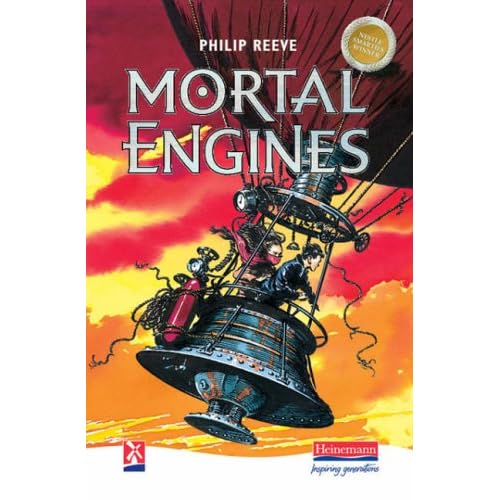 I have traveled vast distances in my search for the holes in my own writing logic, particularly YA novels such as Reeve's Mortal Engines which is a cracking bit of fiction - a high-concept idea welded onto a story of self-discovery:
I have traveled vast distances in my search for the holes in my own writing logic, particularly YA novels such as Reeve's Mortal Engines which is a cracking bit of fiction - a high-concept idea welded onto a story of self-discovery:In this post-apocalyptic world, after the Sixty Minute War destroyed North America, population centres have re-built themselves as traction cities and towns. They travel around the globe, the stronger destroying the weaker. The story is based on London’s attempt at global domination by destroying Shan Guo, the last remaining free state of the world. Valentine, a top archaeologist, is responsible for locating MEDUSA, a weapon so powerful that it can destroy whole cities. However, Tom Natsworthy, an apprentice historian; Katherine, Valentine’s own daughter; Bevis Pod, an apprentice engineer and Hester Shaw, a young disfigured girl, all strive to prevent London using MEDUSA.- Heinemann Resources Sheet
Extract:
It was a dark, blustery afternoon in spring, and the city of London was chasing a small mining town across the dried-out bed of the old North Sea.Here we have an unforgettable opening, but Mortal Engines doesn't stop there. The reader is propelled immediately into the world of Tom Natsworthy, and before we know where we are, his world is thrust out of London and onto the packed-earth of out-country. Aside from its originality it doesn't once stop for a breather or a description of the wider world without relating it to the characters, where they are, how they're interacting. And it does it without an ounce of pretension - it's all in the style.
In happier times, London would never have bothered with such feeble prey. The great Traction City had once spent its days hunting far bigger towns than this, ranging north as far as the edge of the Ice Wastes and south to the shores of the Mediterranean. But lately prey of any kind had started to grow scarce, and some of the larger cities had begun to look hungrily at London. For ten years now it had been hiding from them, skulking in a damp, mountainous western district that the Guild of Historians said had once been the island of Britain. For ten years it had eaten nothing but tiny farming towns and static settlements in those wet hills. Now, at last, the Lord Mayor had decided that the time was right to take his city back over the land bridge into the Great Hunting Ground.
It was barely halfway across when the lookouts on the high watchtowers spied the mining town, gnawing at the salt flats twenty miles ahead. To the people of London it seemed like a sign from the gods, and even the Lord Mayor (who didn't believe in gods or signs) thought it was a good beginning to the journey east, and issued the order to give chase.
The mining town saw the danger and turned tail, but already the huge caterpillar tracks under London were starting to roll faster and faster. Soon the city was lumbering in hot pursuit, a moving mountain of metal that rose in seven tiers like the layers of a wedding cake, the lower levels wreathed in engine smoke, the villas of the rich gleaming white on the higher decks, and above it all the cross on top of St. Paul's Cathedral glinting gold, two thousand feet above the ruined earth.
In the quoted passage above we have the description and then we're related what London has been up to recently and in that recap (a backstep rather than a flashback) we get more description of places. And then we're onto the feeling of the people of London, their interpretations of the situation and their hopes.
I must learn to condense more, move on from a single emotion and develop my story like Reeve. Reeve doesn't wallow in one emotion, he deals with it and moves on, always pushing the plot.





